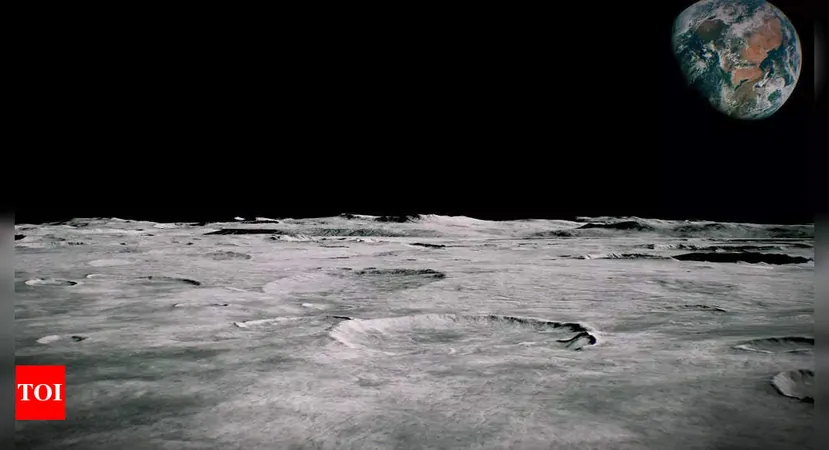
Unveiling the Intriguing Impact of Earth's Lockdowns on Lunar Temperatures
2024-10-08
Author: Mei
A groundbreaking study conducted by Indian researchers has unveiled an astonishing connection between the COVID-19 lockdowns on Earth and notable changes in temperature on the Moon. This research reveals remarkable insights into how human activities can influence environments even beyond our own planet. Get ready to explore the details and the implications this might hold for our understanding of celestial phenomena!
Research Insights
The team from the Physical Research Laboratory (PRL) in Ahmedabad, led by K. Durga Prasad and G. Ambily, meticulously analyzed nighttime temperatures on the lunar surface by employing data gathered from NASA's Lunar Reconnaissance Orbiter. Their focus spanned six specific locations on the Moon's near side, especially during the stringent lockdowns imposed between 2020 and 2021. The research utilized comparative data from 2017 through 2023 to highlight these temperature variations.
Notable Temperature Drops
Their findings indicated a remarkable decrease in lunar temperatures during the lockdown period—by approximately 8 to 10 Kelvin when compared to the same months in previous years. In 2020, the minimum recorded lunar temperature reached an astounding 96.2 Kelvin, a significant dip compared to the more typical temperature ranges observed in other years. Anil Bharadwaj, the director of PRL, emphasized the uniqueness of this work, highlighting its importance in understanding interplanetary dynamics.
Understanding the Causes
The researchers linked this extraordinary cooling effect to a drastic reduction in Earth's emitted radiation brought about by decreased human activities. With factories shuttered and fewer cars on the roads, greenhouse gas emissions and aerosols saw a considerable decline, leading to less heat being trapped in Earth's atmosphere. Prasad noted that "the Moon acts as an amplifier of Earth’s radiation signature," and this global event presented a rare opportunity to comprehend how variations in human behavior could significantly affect our nearest celestial neighbor.
Rule Out Other Influences
While the team carefully considered other potential factors affecting lunar temperatures, such as solar activity or seasonal dynamics, their findings strengthened the argument that the lockdowns were the primary reason for the observed temperature drops. They concluded that these external factors did not significantly contribute to the cooling effects noted during the study period.
Looking Ahead
Though the study presents compelling evidence of the connection between human activity and lunar temperatures, the authors voiced the need for further data to validate the variations in Earth's radiation in relation to lunar conditions. Future lunar observatories could play a pivotal role in enhancing our understanding of Earth's climate and environmental changes. Monitoring temperature fluctuations on the Moon could yield crucial insights into how our actions impact the broader climate system.
The results of this research not only deepen our understanding of lunar science but also highlight the potential ramifications our behavior has on both Earth and beyond. The connection between a global crisis like the pandemic and changes in a celestial body serves as a stark reminder of the intricate links between our environment and the cosmos. Stay tuned for more enthralling discoveries about our universe!



 Brasil (PT)
Brasil (PT)
 Canada (EN)
Canada (EN)
 Chile (ES)
Chile (ES)
 España (ES)
España (ES)
 France (FR)
France (FR)
 Hong Kong (EN)
Hong Kong (EN)
 Italia (IT)
Italia (IT)
 日本 (JA)
日本 (JA)
 Magyarország (HU)
Magyarország (HU)
 Norge (NO)
Norge (NO)
 Polska (PL)
Polska (PL)
 Schweiz (DE)
Schweiz (DE)
 Singapore (EN)
Singapore (EN)
 Sverige (SV)
Sverige (SV)
 Suomi (FI)
Suomi (FI)
 Türkiye (TR)
Türkiye (TR)